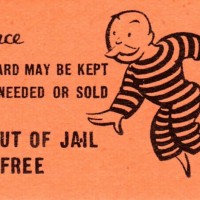'Dynamic pricing on websites: illegal or unfair?', asks Éloïse Gratton on her blog. But the post confuses various pricing strategies, not all of which are 'dynamic pricing'. Dynamic pricing, also known as “adaptive pricing”, “dynamic pricing” or “discriminatory pricing” or first-degree price discrimination, is defined as a practice where organizations attempt to perfectly exploit the differences in price sensitivity between consumers. Dynamic pricing is an old practice that has been around forever: for example, if you go to a flea market, the … [Read more...]
Archives for October 2014
Today in deaccessioning: casino edition
Today's case is from Germany, as reported by Artnet: Triple Elvis (1963) and Four Marlons (1966) hold a combined estimated value of €100 million ($128 million) and are being sold by the Westspiel casino conglomerate ... [T]he casino chain Westspiel is in fact a subsidiary of the State Bank of North Rhine-Westphalia. This prompted German culture minister Monika Grütters of the center-right CDU party to accuse North Rhine-Westphalia's center-left-led regional government of selling the artworks in order consolidate state debts. She … [Read more...]
What do college students in the arts do after graduation? (updated)
They get to use what they have learned in college?: Among ... respondents employed at the time they completed the survey, 64% of recent grads and 69% of prior graduates were in jobs they described as either “very relevant” or “relevant” to their educational training. Or not?: The majority of arts graduates work in non-arts fields. Out of 2 million arts graduates nationally, only 10 percent, or 200,000 people, make their primary earnings as working artists. Let's try to sort out how and why the recent report from the Strategic National Arts … [Read more...]
Deaccessioning: A puzzle, and a speculative answer (updated)
Why is it considered unethical for nonprofit or public sector museums to sell art, except for cases when the proceeds will be directly used to acquire new art? At the Art Law Blog, Donn Zaretsky points out that if a private collector decided to open a space to display some art he owns to the public, but later decided to sell some of it, for whatever reason, it would be hard for anyone to object. But if the collection becomes a nonprofit museum... : One answer some might be tempted to give is that becoming a museum carries with it certain tax … [Read more...]
What’s new in dynamic pricing?
There's a good, well-informed post by Tim Baker on 'The State of Dynamic Pricing'. So, what do we know so far? First, on the term. Dynamic Pricing is not about offering different prices to different market segments, nor is it about scaling the house or other quality differentials, nor about discounts for subscriptions and memberships, nor about pricing differently for shows and times where it is easily forecast that demand for tickets will be higher or lower than usual, nor about posting prices of the '$10 in advance; $12 at the door' … [Read more...]
Amazon and monopoly: encore (updated)
The debate that won't die. I've posted on whether Amazon is a monopoly (it isn't) here and here. Today Joe Nocera joins Matt Yglesias and Annie Lowrey in his critique of Franklin Foer's New Republic article that tries to claim dangerous monopoly powers at Amazon. Artsjournal.com blog neighbor Scott Timberg addresses Nocera: But on the larger question of whether Amazon is literally and technically a monopoly: Probably not, but the distinction is not all that important. It’s a bully, it’s destroying important institutions, and it’s getting more … [Read more...]
Culture and urban growth: we still don’t know much
A few years ago I came across a paper by Oliver Falck, Michael Fritsch and Stephan Heblich, 'The Phantom of the Opera: Cultural Amenities, Human Capital, and Regional Economic Growth' that used a rather unique data set to try to get around the knotty problem of finding whether cultural amenities generated urban economic development, or followed urban economic development: We analyze the extent to which endogenous cultural amenities affect the spatial equilibrium share of high-human-capital employees. To overcome endogeneity, we draw on a … [Read more...]
Jean Tirole, theory and application
Jean Tirole has won the 2014 Nobel Prize in Economics. Because he works in microeconomic theory that is not easy going for those without advanced training in mathematics or economics, his is not a well-known name outside the discipline (even econ undergrad students may not have heard of him, though all graduate students will have). But that doesn't make his work any less important. His work in economic theory on incentives, principal-agent problems, and 'industrial organization' (the term that in practice means the analysis of sectors of the … [Read more...]
Art and the estate tax (updated, again)
The New York Times reports on the Elkins case, involving a victory for a wealthy family in a legal fight with the IRS on estate tax owing on a valuable art collection. This is the quote that caught my attention: “My genuine view is this is a great result for taxpayers, but I don’t think everything is clear,” said Diana Wierbicki, a partner and head of the global art practice at Withers Bergman, a law firm. “The I.R.S. dropped the ball. The I.R.S. pushed this idea that you should get zero.” The latter part of the quote concerns the discount … [Read more...]
Tax deductions for artists (updated)
The New York Times reports on a court case involving whether an artist working for salary as teaching faculty can claim tax deductions of artist's expenses (for supplies, travel, meals, etc) in excess of profits earned on sales of art. My understanding of this (tax people please correct me if I have this wrong) is that these net losses can be applied against salary and other earnings, thus lowering the tax owing: The I.R.S., which accused Ms. Crile of underpaying her taxes by more than $81,000 from 2004 to 2009, argued that based on several … [Read more...]










